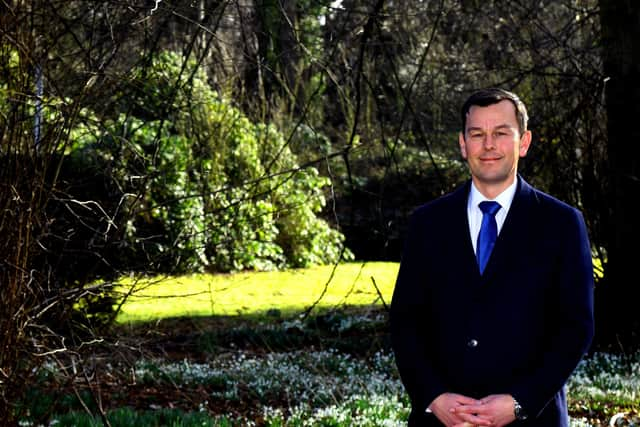Prostate cancer: Time for national men’s health strategy to help NHS to save lives and money – Nick Fletcher
We have no men’s health strategy in this country, but we should do. I refer to the great work done by the all-party parliamentary group on issues affecting men and boys, which I have the honour of chairing.
Advertisement
Hide AdAdvertisement
Hide AdTo date, we have issued two reports that show the need for a men’s health strategy, which would provide an overarching and joined-up plan to end the gender age gap.


That is desperately needed in the UK, where one in five men will die before their retirement. One man commits suicide every two hours, and 86 per cent of homeless people are men. Some 95 per cent of prisoners are men, and 97 per cet of fatal accidents at work happen to men. These are appalling statistics.
Far worse than the awful numbers is the sobering fact that 30 men die every day from prostate cancer, which amounts to 11,900 deaths a year.
Let me explain what those numbers mean. There are 430 male MPs in the House of Commons, out of a total of 650 Members. Some 16.7 per cent of all men will get prostate cancer, which means that 71 male Members of the House will get it. That is more than 11 per cent of all Members — more than one in 10 of us. Many deaths could be avoided if we had a prostate screening programme.
Advertisement
Hide AdAdvertisement
Hide AdUntil now, the NHS has taken the view that screening for prostate cancer would not meet the national and international criteria laid down for a viable and valuable screening programme. Instead, the NHS adopts a wait-and-see policy.


However, medical science has progressed, and the historical objections are no longer valid.
The data shows that the age of 50 onwards is the danger zone for men. Only four cases of prostate cancer per 100,000 happen in men aged 40 to 44, but the figure rises to 6,285 for men aged 60 to 64. Men between 50 and 80 are most at risk.
The data shows beyond doubt that a man of African heritage is twice as likely as a Caucasian male to contract prostate cancer. Research from 1995 showed a drop of 44 per cent in mortality over 14 years when screening takes place, and another trial showed a reduction of 21 per cent. Whichever figure we take, it is a staggering number of lives that could have been saved — 2,000 lives or more every year.
Advertisement
Hide AdAdvertisement
Hide AdThe issue has been the effectiveness of screening and the cost, but medical science has moved on. A simple prostate-specific antigen blood test is inexpensive, costing literally pennies, and it will help to identify high antigen counts so that we know who is most at risk.
These men can then be monitored and re-tested after a further three months. The relatively few men who still have a high number of antigens can then be given an MRI scan to confirm beyond doubt whether they have prostate cancer or not. Those who are diagnosed can then be treated, thousands of lives will be saved, and thousands of lives will be longer and will be quality lives.
Does screening work? The current breast cancer screening programme is believed to save 1,300 lives a year. Around 2,600 women are diagnosed with cervical cancer each year and 690 women die of it each year. It is estimated that 83 per cent of cervical cancer cases would be avoided if all women used the cervical cancer screening programme. Screening works well for breast cancer and cervical cancer. It is proven to work. So why do we not have a screening programme for prostate cancer?
Implementation of a prostate cancer screening programme would obviously be beneficial for the men involved, but it would also be beneficial for their family, their friends and the country at large.
Advertisement
Hide AdAdvertisement
Hide AdEarly diagnosis will save the economy money, as it will enable those affected to continue working rather than being dependent on the welfare state. It saves the NHS money in avoiding the expensive treatments that would be needed for advanced cancer.
Wives will not lose their husbands, children will not lose their fathers, and friends and other loved ones will not be emotionally scarred by grief.
I have two asks: can we seriously consider putting in place both a national prostate screening programme and a men’s health strategy? These initiatives will save money, but much more importantly they will save lives.
Nick Fletcher is the Tory MP for Don Valley who spoke in a Parliamentary debate on prostate cancer – this is an edited version.
Advertisement
Hide AdAdvertisement
Hide AdSupport The Yorkshire Post and become a subscriber today. Your subscription will help us to continue to bring quality news to the people of Yorkshire. In return, you’ll see fewer ads on site, get free access to our app, receive exclusive members-only offers and access to all premium content and columns. Click here to subscribe.
Comment Guidelines
National World encourages reader discussion on our stories. User feedback, insights and back-and-forth exchanges add a rich layer of context to reporting. Please review our Community Guidelines before commenting.